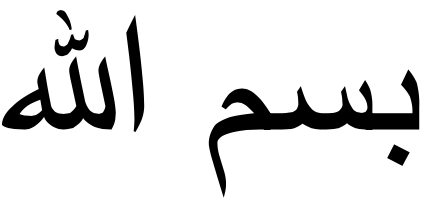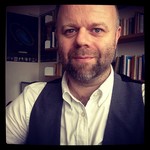First steps ....
The beginnings of my public work on Islam ... and Germany.

I have been researching aspects of Islam for nearly seven years now. I have read the Qur’an in various translations and read widely within the Hadith. I have read about the history of Islam as a faith and in its wider cultural senses, studied aspects of Islamic law, the history of Islamic art, and read histories of the great Islamic nations and empires. By training, though, I am a scholar of German Studies and as such I have been viewing Islam through the ‘lens’ of German history and culture. I have been investigating what German speakers of different backgrounds, persuasions, affiliations and ideologies knew about Islam in its many forms and how they represented it in word and image across a range of different types of writing, from around 1770 until the end of the First World War. At its best, this approach offers us as much insight into German cultural, intellectual and political history as it does into the Islam. Along my travels I have engaged with so-called high literature, encountering recognizably ‘great’ writers such as G.E Lessing and Goethe, as well as virtual unknowns; I have looked at travel writing, the Islamic scholarship of German academic Orientalists and thought about the way Islam was used in the political thought and writing of the period. In other words, I have been reading books and documents, usually in libraries and archives, usually in silence and in relative isolation. And as this is a huge passion of mine, so it will continue.
Now, though, my project is entering a more outward-facing phase. I will be talking about my work in public, addressing non-academic communities and, most significantly, talking to Muslim groups. I am in dialogue with a range of Mosques and Islamic Centres across the UK, especially in the Midlands and in the South East. First contact was often difficult. E-mails remained unanswered, telephone messages were not returned and, when conversations happened, they were brief and their outcomes ambivalent. Most mosques have some form of outreach officer who arranges visits by non-Muslims. When this is a matter of school groups, most mosques are keen to welcome visitors, offer tours and explain aspects of faith in an educational context: this is a key function of a mosque and an extension of Islamic teaching. Yet many mosques are far more cautious in inviting people from outside their community to speak. In the event, though, I found the initial lack of response was more often a delay in response, as various groups of elders met to discuss my offer. Questions were often put to me response. Who was I? What were my motivations? What did I want to talk about, and to whom? This is more than understandable in the current climate of tension. After a few face-to-face meetings, though, and with some further petitioning and much explanation, I am delighted to say that I have secured a number of invitations for 2015. I will write more on these as they unfold.
That we live in a climate of tension which, from a Muslim point of view, makes my visits potentially controversial, ought to be plain enough. After nearly three decades that have seen the growth of radical Islamism globally, the attacks of 9/11, the rise of ISIL and the self-proclaimed establishment of an Islamic khilāfa, as well as the growth of radical Islam within Western democratic societies, or home grown jihadis, Western media are saturated with references to Islam. In this context Islam has become all too synonymous with Islamism, however. Moderate Muslim voices do not figure largely here, or at least make little impact upon media narratives. Bombings, beheadings, and, in the days before this posting, the shootings at the Parisian offices of the French Satirical magazine Charlie Hebdo are far more visceral occurrences and come to dominate public discourses. The resultant backlash within non-Muslim majorities is discernible all across Europe. Grassroots protest movements such as ‘Britain First’ in the UK or, most recently, the ‘PEGIDA’ movement in Germany call for a halt to what they see as the creeping Islamification of Western societies. These movements engage in everything from demonstrations that seek to re-assert the hegemony of Christian culture within European cities, to heated confrontations at mosque doors as militant groups challenge Muslims on aspects of their beliefs and behaviour.
Little surprise, then, that when I call a mosque the public relations officer asks me 'who I am' and 'what I want'. All the better, though, that an openness prevails nonetheless and that I am to be invited to speak. My talks will seek to use examples from German history to show that we in ‘the West’ do not live in times of unprecedented, polarized conflict with some universal Islamic enemy – and we never really have. Patterns of antagonism disappear and return cyclically across the centuries and even the worst of conflicts always coexist with less oppositional relationships,those founded upon cultural exchange and dialogue, shared heritage, values and identities. My material from the long nineteenth century shows all of this time and again. My very first step will be to speak to the Islamic Society at the University of Warwick on 22 January 2015 as part of a series of talks entitled, ‘Islam and Me.’ It will involve reflecting on how I came to this subject and on my developing relationship to Islam as a whole. As far as Muslim audiences go this is not likely to be a tough crowd: it will be a diverse group of Muslims on a multicultural university campus who are seemingly well disposed to speakers such as me. This, though, really is only the first step along a journey that will doubtless hold more twists and turns. But an important step, nonetheless ... bismillah.
JRH, 09.01.2015
a UK academic exploring Islam through global history and culture.
